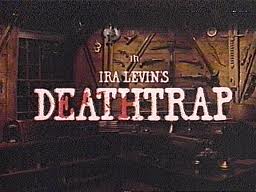
My father dreamed of writing a best-selling mystery novel. After he retired from teaching high school, he authored 10 non-fiction books, but secretly wished he could sit down and develop a crime thriller. His problem was that his mind didn’t work like that. While he was a great consumer of movies of that (and every) genre, he knew that he couldn’t create the intricacies necessary to the kind of multi-level plots that Ira Levin and Agatha Christie and Sue Grafton
and Ridley Pearson
and other crime writers mastered.
He was also jealous of my wife, who devours mystery books and usually has them figured out long before their denouement. She figured out Scott Turow’s “Presumed Innocent” in chapter four. To this day, when she and I watch a crime thriller together, whether it’s a movie or a TV show, she’s almost always the first to know not only who done it, but how. Occasionally I’ll take a guess and be right, but her batting average is much higher. Sometimes I wonder what she is plotting when I’m not looking.
I thought of that last night as I showed my daughter the movie “Deathtrap.” I saw a stage version circa 1980 with George Grizzard in the lead role, and was totally taken by the way playwright Ira Levin wove the plot of a clever murder thriller around characters who are trying to devise the plot of a clever murder thriller for a Broadway show.
There are several moments in the play with true shocks and twists, and I won’t spoil all of them for anyone who hasn’t seen it, but one of them did not involve any thrills or chills or acts of violence. Instead, it involved the two lead men kissing on the lips. Such public displays of gay affection were rarely seen 30+ years ago, so it was surprising, but it worked as a big reveal about the characters and their motives, and helped the audience become even more invested in the plot.
When the movie version came out, there was a different response.
The two leads were Michael Caine and Christopher Reeve, in only his second role after the huge worldwide success of “Superman” had made him an instant mega-movie star. His first was “Somewhere In Time
,” a romantic period piece with Jane Seymour that did pretty well, but “Deathtrap” came as a real surprise to a lot of people because of that kiss. The brains of some audience members short-circuited as if they’d just learned Superman was gay. Although this was an entirely different character, they couldn’t accept it, even though Reeve was fine in the role and managed to match Caine’s intensity and Dyan Cannon’s loony anxiety. Sidney Lumet’s direction added even more tension to Levin’s plot and opened up the play a bit, but the box office suffered because of the casting of Reeve.
It’s a shame, because it all seems so tame now. My daughter, a child of a different generation, didn’t even flinch at the kiss, but was caught up in the suspense and on the edge of her seat whenever the music swelled with the anticipation of someone about to do something dastardly. Unlike my wife, she didn’t see any of the twists coming, but that didn’t stop her from falling back on the couch with a smile of satisfaction as the credits rolled.
Like her grandfather, she may never write a best-selling mystery, but she sure knows how to enjoy one.
